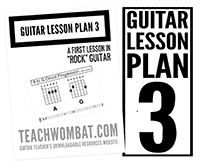
There are three main types of guitar teaching job
1: Teaching guitar in schools and colleges
2: Teaching guitar in music stores
3: Teaching guitar at home
All three have their own set of pros and cons and this page will look at them in some detail
The Three Types Of Guitar Teaching Job
Can you make a secure, long term reliable income as a school guitar teacher and are there any steps you could take to improve your position?
Teaching guitar in a school or college environment can be a great way to earn money. There are many advantages to teaching guitar this way but the work comes with a potential "downside" that anyone new to the job should be aware of that can leave a teacher vulnerable to forces outside of his or her control This page investigates the subject and sets out some simple and practical strategies that a guitar teacher can use to help minimise the "risk" that can be built into making a living from teaching guitar in the school and college sector

Three Models Of Employment for Guitar Teachers wishing to earn some or all of their income from teaching in schools
Would you rather be a Panda or a Rat?
Ok so you are (or want to be) a Guitar teacher working in schools You have all of your Guitar Lesson Plans sorted out and you have enough Backing Tracks and Handouts to last you your entire teaching career? The only sensible question that remains is "Would you rather be a Panda or a Rat?"
Have I lost what little is left of my mind? Has Mrs Wombat been dropping funny looking mushrooms into my omelettes? Not a bit of it! Behave like a Rat and greatly increase your chances of making long term money from guitar teaching. Adopting the way of the Panda and you risk extinction.... Let me explain........
When people see a Panda they generally love it. When they come across a rat the first instinct is to hit it with a shovel. A no brainer then, Lets be a Panda! but the devil (as always) is in the detail. Guitar teachers who adopt the business model of the panda will probably be pretty well paid and have a great time until they suddenly find that they are out of the panda business and have to fit their huge furry frames behind the wheel of an Uber to keep body and soul together while those who follow the "way of the rat" can be more assured of a long and prosperous guitar teaching career.
Pandas (can) only eat bamboo. Nothing else eats bamboo. As long as there is a readily available supply of bamboo (and pandas tend to live in what are called "bamboo forests) there is absolutely no problem at all. Loads of food, no competition for it and you can eat as much as you like. It is probably no coincidence that pandas can be regarded as the "plus size models" of the cute wildlife club. The problem with being a panda comes when the supply of bamboo suddenly and unexpectedly dries up because the land that the bamboo grows on is in demand to grow other crops or to build cities and factories. No Bamboo - No Pandas, its that brutal and that simple.
The humble rat on the other hand can eat just about anything (including other rats) and can survive just about anywhere. Chop your local bamboo forest down and try to build a city on it and before very long there will be a rat problem. Rats are versatile. They do not depend upon a single and unique set of benign circumstances for their existence. They can eat meat, grain, vegetables and even their own young if the need arises. Rats are in it for the long haul and if you want a guitar teaching career to be something that you can look back on as having given you a long, sustainable and prosperous working life then my contention is that you have more to learn from the rat than the panda. The ability to adapt to changing circumstances and not to rely on a single source of food (money) is one of the most important attributes that a guitar teacher can have.
Guitar Teaching Jobs: Three basic Models
There are three basic models of a guitar teaching job, each one in its own way made of bamboo. A single defined income stream and when times are good or a guitar teacher is just lucky this one source of money can in itself be enough to put food on the table every week.
Each type of job comes with its own inbuilt advantages and disadvantages and it would be wrong to say that one is "better" than the other. In reality it could be argued that an ideal situation would be where a teacher took advantage of the opportunity to forge a career in all three areas making him or herself less vulnerable to changes in any particular sphere and that is the thrust of this article. I wish to encourage a situation where guitar teaching can become a little "safer" for those who do it.
What follows is a short analysis of each of the three common models of guitar teaching (in schools and in other situations) along with an investigation of the implications (both positive and negative) of following a career in each of the areas. My contention will be that the most successful (rat like) guitar teachers combine the models as need or opportunity arises.

Peripatetic Guitar Teacher Jobs
Teaching Guitar In Schools and Colleges
One of the most common types of employment available for an educator is teaching kids to play the guitar in a school and college environment and this model of employment has a lot going for it. The advantages are that in schools there exists a ready made supply of potential customers (the existing students of the institution) whos numbers are refreshed on an annual basis when this years new intake of students arrives in August or September and the "captive audience" that the school has saves you the trouble of having to go out and scare up your own customer base. Another advantage to this type of teaching is that the places that you teach will probably be well resourced in terms of any equipment (amplifiers/printers/photocopiers etc) that you might need to access during your working day.
This type of guitar teaching has a lot going for it but there is a downside to it. One of the main problems associated with teaching guitar in schools is that you can only earn money when the institution is open for business which means that during the (sometimes long) holiday period your teaching income can dry up completely if this is the only type of teaching work that you have. When you teach guitar in a school or a college the chances are that your hourly rate of pay will be quite healthy but seems a lot less attractive if you start to think about the fact that for up to three months of the year you will have no money coming in from this income stream. It is the norm to be paid at the start of each semester or term and in reality because of the way typical school or college years are structured there tends to be a large payment around about Easter time and then nothing until September when the new academic year begins. If you get this kind of teaching wrong you will always be playing "catch up" financially with each time of plenty being used to pay off the debts run up between the (typically) three times per year that the cheques come through.
Another potential pitfall commonly encountered by those who teach guitar in schools is that by nature the work is not secure. The job of guitar teacher in a school or college tends to be casual (paid only on the basis of hours worked) rather than salaried (with a secure permanent contract and money split evenly over the year). To add to the insecurity the task of sourcing instrumental teachers is often left to a single individual(most often the head of the music department) and if you get on the wrong side of this individual (or if their old friend from college loses a guitar teaching position in another school!) then you can find that you are suddenly out of a job. It is by no means unusual for a teacher to work somewhere for years with no problems only to find that when September rolls around they just don't get the call from the school to go back. Depending upon where in the world you live instrumental tuition is often the responsibility of a local music service or other administrating body but the reality is exactly the same. If the individuals responsible for dishing out guitar teaching jobs decides that you are not getting one this year and if teaching guitar in a single school is your main source of income then you are in trouble.
If you set out to teach guitar in schools and colleges the best way to minimise the impact from this kind of situation is to try to ensure that you have employment in at least two different institutions and that employment is given to you by at least two different people (or organisations). That way should a music teacher at one of your regular schools move on to be replaced by someone else with their own team of casual teachers waiting in the wings (very common) then you will not lose your entire income at one time. Another plus side to this is that human nature being what it is people who give jobs out are likely to treat you better when they know that you don't have to work for them and that other heads of music in other schools are keen to offer you work should the opportunity arise. I once talked to an instrumental teacher who had a great deal (it ran into four days per week) of teaching in a single (very large) school complex. This work made up by far the largest part of his annual income and he said that his entire summer holiday was routinely spoiled by what he described as a feeling of being on "death row" until the email or phone call came in confirming his status as "the chosen one" for another year. It is probably better if you dont ask what eventually happened.
Teaching Guitar In A Music Store

Teaching Guitar in a Music Store
Depending on which part of the world you live in this is a very well established route into teaching. Bricks and mortar music stores often offer instrumental tuition to their customers and working in one or more of these places can (when done properly) offer a useful and regular income to a guitar teacher. The store (like the school) more than likely takes responsibility for booking guitar lessons for their customers and as is often the case when working in schools and colleges its jus a case of turning up and teaching.
Because ultimately your position as guitar teacher depends upon the owner of the store there can be a similar level of insecurity with regard to pleasing the people who run/own the store. Another disadvantage is that wether we like it or not (and I dont) physical music stores you can walk into are thinner on the ground than they used to be and wont be making much of a comeback anytime soon so this is a "shrinking market" for anyone setting out to teach guitar. The folks over at Amazon will happily send a robot to pluck a guitar in a box from the top of a pile and slap a label on it and you can have it tomorrow
Speaking from a personal point of view the idea of shelling out the price of a holiday or even a sofa on a guitar that I have not actually played (no matter what the reputation of the manufacturer) has the same level of appeal as a do it yourself vasectomy. The amount of variation in quality between different examples of supposedly identical guitars is so great that Im not about to throw money at a picture on the internet. If I'm going to play it for years I want to play it before I part with hard earned money for it.
Despite the rant above though I'll have to admit and accept that I appear to be in the minority here. It seems that a large proportion of the guitar buying public would rather save fifty bucks on the price of a $700 guitar that they have seen a picture of on a website and have it dropped to their door than go out and try 10 instruments in their price range before finally ending up with a guitar (rather than a picture) that they actually love to play (that the guy in the store would probably give you a $50.00 discount on anyway if you asked him).
If mail order brides (or grooms) are your thing then thats a choice that you are perfectly entitled to make and good luck to you. Im sure it often works out great but I'll pass. Either way the point that Im making is that a change in shopping habits there are more music stores closing than opening and this is a trend that does not look like being reversed in the short or medium term. If you are lucky enough to get a job teaching guitar in a nice friendly relaxed local music store then treasure and value the position. Be nice to the customers who keep it going and to the owners who are fighting the good fight against the monsters of the internet. Have a great time but try to make sure that this type of guitar teaching is not your only source of income.
Teaching Guitar In your Own Home

Teach Guitar From Home
A job teaching guitar in your own home is the basis of another well established business model that comes with its own set of advantages and disadvantages. The advantages are considerable. Start up and running costs for a home based guitar teaching business are minimal. You already have the guitars, amps and music reproduction equipment etc required to get the venture up and running and bearing this in mind almost every dollar that you make will be pure profit. If you live in the right kind of place and area this business model can be very attractive but if we delve a little deeper some complications become apparent.
Something to consider is that any kind of half busy guitar teaching practice will need an entire room devoted to it and depending upon your domestic circumstances this can cause problems due to the fact that the busy times for guitar teachers who work from home often tends to be evenings and weekends (exactly the time when "normal people" are chilling out in their own houses). Unless you live alone the person/people that you live with will have to have an understanding and relaxed attitude to an ever changing cast of strangers traipsing through the house, drinking the coffee and(in certain circumstances) leaving the seat up. I earned most of my living from doing gigs and teaching guitar like this. I had a great time, made some friends who I still hang around with until this day but to be honest once I moved into other types of teaching and my own domestic circumstances evolved to include the production and servicing of children then I was happy to be in a position to (for the first time) separate my domestic and financial lives from one another. Even though I have (I am assured) more guitars than is strictly necessary cluttering up my house (filling an entire room I'm only a little bit ashamed to say) the thought of teaching guitar from home again does not fill me full of joy. Having said that it was a great (the best?) way for me to get into teaching and I would not have been able to develop a guitar teaching career any other way. If you have the chance to do it and are in the right domestic circumstances or stage of life then there is no better way into the business of teaching guitar. A job teaching guitar from home gives you the perfect opportunity to dip your toe into the world of guitar teaching to see if it is for you.
So there we have it. The Panda or the Rat? The three main models of "one on one" or group guitar teaching and some of the associated pros and cons (teaching over the internet is a whole different ball game and I don't have the time or space to delve too deeply into it here). There are other variations such as travelling to a students home in order to teach them which can work well but remember that you need to be paid for the travelling time too? and the more rare (and risky?) route of starting up your own bricks and mortar guitar school which is expensive and not for the faint hearted. If you are thinking about a career teaching guitar and intend doing it for a long time then it makes sense to spread your professional activities around with a some school and/or music store work combined with a "private practice" (that you can temporarily expand if you suddenly lose a position in an institution)running alongside it. If you are teaching in institutions (schools and stores) you should look to teach in more than one to reduce the risk of most or even all of your income disappearing suddenly.
If you have an interest in the more theoretical side of guitar teaching you could take a ride over to our guitar pedagogy page which takes a closer look at theory, technique and repertoire, the "three pillars of guitar teaching wisdom"


























